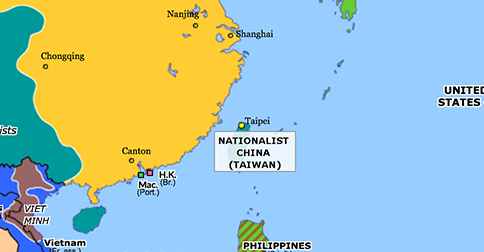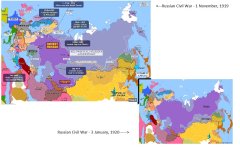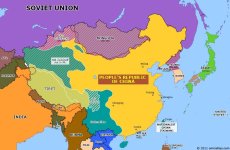raharris1973
Well-known member
What if the PRC from 1 December, 1949, is ISOT'ed back 30 years to 1 December, 1919?
This is the entire territory sovereignly controlled by the PRC, so the only exceptions are the remaining foreign leasehold territories, which in 1949 were the Portuguese leased Macau, British leased Hong Kong, and Soviet leased Dalian and Lushun/Port Arthur on the Guangdong peninsula. Those don't ISOT back, so they remain in their 1919 incarnations, which are controlled by Portugal, Britain, and Japan, respectively. However, by 1919 numerous other concession areas and leases throughout other Chinese cities and ports like Beijing, Tianjin, Shanghai, Guangzhouan had been abolished, so their 1919 foreign owners/protectors will wonder where their property, expats, and regular contacts suddenly disappeared to.
The Chinese PLA has just occupied Chongqing, and is poised to begin the occupation of Chengdu, and the remaining southwestern provinces. PLA forces are fanned out in an arc to complete the occupation of the western portions of China, along the southern border, where they've recently conquered and chased KMT remnants across the border, and in Guangdong & Fujian, across the straits from the Nationalist held islands of Hainan and Taiwan.
The PRC government has diplomatic ties to establish with the Russian Federated Soviet Republic. Mao Zedong, his comrades, and likely Soviet personnel present in China likely have some "news from the future" they would like to convey to the USSR about the quarter century ahead.
The PRC also would probably like to change the situation of having the Japanese Empire as a neighbor on land, ASAP, seeing the Japanese removed from the Guangdong peninsula and Korean Peninsula, in that order. Beijing also desires Japanese ouster from Taiwan and the Pescadores, but that is probably less strictly urgent, from a pure security POV, and probably also more difficult to accomplish.
The Russian Communists at this moment are still going through their own Civil War in December 1919, and are at war with Poland. In the parts of Russia bordering China, it is White Russians, aided by foreign, especially Japanese, and even some Chinese warlord, troops who are in control, so Mao has every incentive to take fraternal socialist action and send PLA fighting volunteers to help the Bolshevik side. The White side in the Russian Far East/Siberia is in fact finding its supply-line through the Manchurian railways interrupted by PRC control, even while they still control the Trans-Siberian leg north of the Amur. The PLA needs to re-allocate some forces back to the northeast to protect it, and to cross the border to work with Bolshevik partisans to interdict or capture the TSR and get the Japanese out of the Amur and Primorye districts in addition to Port Arthur.
Conveniently for Mao, this is also an opportunity for him to subborn or overpower the Chinese Beiyang/warlord troops in Outer Mongolia & Tannu Tuva so that those regions are clearly integrated with the PRC and under its authority before the Soviet Civil War is resolved. Indeed, intervention in the Russian Civil War on behalf of the Bolsheviks can provide an opportunity to correct past unequal Sino-Russian treaties, or at least parts of them.
This is also a period of dissent within Korea, and a period when the Japanese public, unlike the 1930s, was not squarely behind military adventurism. However, military humiliation and offended pride can most likely convert the broad Japanese public into a conformist, right-wing frame of mind.
In 1919, on thing Mao certainly *cannot* count on is western countries being anti-Japanese in Japanese struggles with Communist Russians and Chinese.
How do things develop from this starting point?
This is the entire territory sovereignly controlled by the PRC, so the only exceptions are the remaining foreign leasehold territories, which in 1949 were the Portuguese leased Macau, British leased Hong Kong, and Soviet leased Dalian and Lushun/Port Arthur on the Guangdong peninsula. Those don't ISOT back, so they remain in their 1919 incarnations, which are controlled by Portugal, Britain, and Japan, respectively. However, by 1919 numerous other concession areas and leases throughout other Chinese cities and ports like Beijing, Tianjin, Shanghai, Guangzhouan had been abolished, so their 1919 foreign owners/protectors will wonder where their property, expats, and regular contacts suddenly disappeared to.
The Chinese PLA has just occupied Chongqing, and is poised to begin the occupation of Chengdu, and the remaining southwestern provinces. PLA forces are fanned out in an arc to complete the occupation of the western portions of China, along the southern border, where they've recently conquered and chased KMT remnants across the border, and in Guangdong & Fujian, across the straits from the Nationalist held islands of Hainan and Taiwan.
The PRC government has diplomatic ties to establish with the Russian Federated Soviet Republic. Mao Zedong, his comrades, and likely Soviet personnel present in China likely have some "news from the future" they would like to convey to the USSR about the quarter century ahead.
The PRC also would probably like to change the situation of having the Japanese Empire as a neighbor on land, ASAP, seeing the Japanese removed from the Guangdong peninsula and Korean Peninsula, in that order. Beijing also desires Japanese ouster from Taiwan and the Pescadores, but that is probably less strictly urgent, from a pure security POV, and probably also more difficult to accomplish.
The Russian Communists at this moment are still going through their own Civil War in December 1919, and are at war with Poland. In the parts of Russia bordering China, it is White Russians, aided by foreign, especially Japanese, and even some Chinese warlord, troops who are in control, so Mao has every incentive to take fraternal socialist action and send PLA fighting volunteers to help the Bolshevik side. The White side in the Russian Far East/Siberia is in fact finding its supply-line through the Manchurian railways interrupted by PRC control, even while they still control the Trans-Siberian leg north of the Amur. The PLA needs to re-allocate some forces back to the northeast to protect it, and to cross the border to work with Bolshevik partisans to interdict or capture the TSR and get the Japanese out of the Amur and Primorye districts in addition to Port Arthur.
Conveniently for Mao, this is also an opportunity for him to subborn or overpower the Chinese Beiyang/warlord troops in Outer Mongolia & Tannu Tuva so that those regions are clearly integrated with the PRC and under its authority before the Soviet Civil War is resolved. Indeed, intervention in the Russian Civil War on behalf of the Bolsheviks can provide an opportunity to correct past unequal Sino-Russian treaties, or at least parts of them.
This is also a period of dissent within Korea, and a period when the Japanese public, unlike the 1930s, was not squarely behind military adventurism. However, military humiliation and offended pride can most likely convert the broad Japanese public into a conformist, right-wing frame of mind.
In 1919, on thing Mao certainly *cannot* count on is western countries being anti-Japanese in Japanese struggles with Communist Russians and Chinese.
How do things develop from this starting point?




